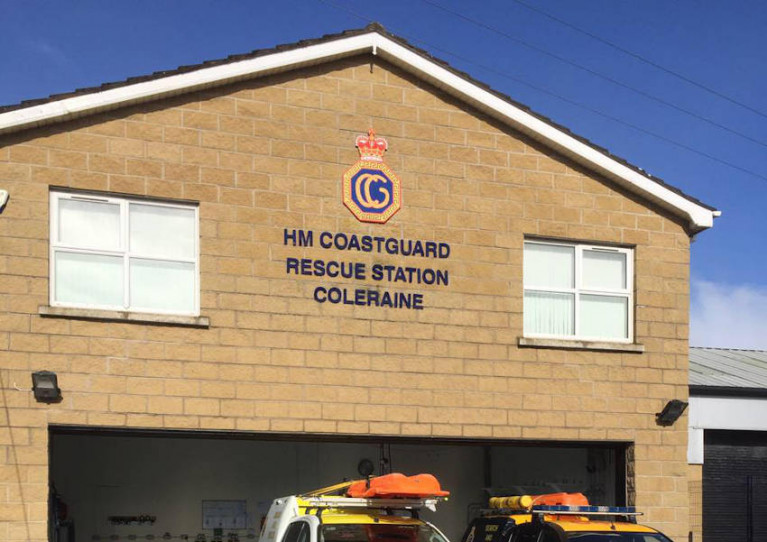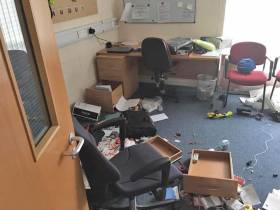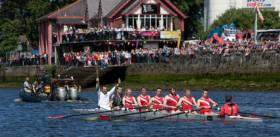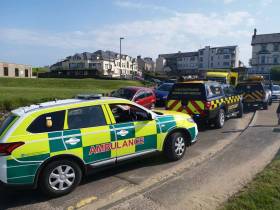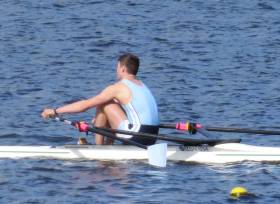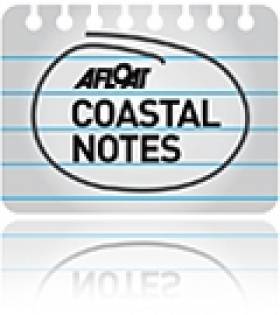Displaying items by tag: Coleraine
PSNI Officers Rescue Kayakers From Strong Tide in River Bann
Police officers in Coleraine have been praised after their rescue of two kayakers from the River Bann in Northern Ireland earlier this week.
Dog walkers noticed the kayakers had gotten into difficulty in the river at around 6.20pm on Tuesday 9 January. They called 999 and multiple emergency and voluntary services were dispatched to the area.
PSNI officers were the first emergency responders on the scene and found the kayakers clinging to branches after being caught in an unexpectedly strong tide.
Two officers entered the cold water and, with the assistance of colleagues on the riverbank, were able to bring the men safely to waiting ambulances which took them to hospital for treatment.
Speaking to BBC News NI, Superintendent Mark Roberts said: “The change in the current was so strong, one of the kayaks was swept away, leaving a gentleman clinging to a tree and another one just standing in the water off the bank.”
Both kayakers were taken to Causeway Hospital in Coleraine for treatment after their ordeal.
Chief Inspector Vince Redmond commented: “I am delighted that these men were brought to safety, and that our officers showed such resourcefulness, skill and courage.
“Their work on Tuesday evening was the embodiment of ‘keeping people safe’ in our community.
“This was a fantastic example of collaborative working with our colleagues from Northern Ireland Ambulance Service, Northern Ireland Fire and Rescue Service and the indispensable volunteers of Community Rescue Service. There’s no doubt in my mind that lives were saved as a result.”
Swimmers & Surfers On NI’s North Coast Urged ‘To Be Extra Vigilant’ As Summer Lifeguard Service Ends
With the RNLI’s summer lifeguard service now ended for 2020, swimmers and surfers on Northern Ireland’s North Coast have been urged “to be extra vigilant”.
The warning from Coleraine Coastguard comes after three swimmers got into difficulty at Castlerock Beach on Friday (18 September).
One swimmer made it to shore while the others were helped ashore by a local surfer. All three were medically assessed by coastguard officers and the NI Ambulance Service.
The casualties were “shocked” by their ordeal “but thankfully fit and well”, Coleraine Coastguard said later.
“Conditions on our beaches can change quickly and strong currents are currently running with the high tides,” the coastguard added.
“Now that the summer lifeguard service has ended around most of our beaches, we urge people to be extra vigilant when swimming or surfing.
“If you see anyone in difficulty, don’t hesitate to dial 999 [and ask for the] coastguard.”
Coleraine Coastguard Volunteer Tied Up By Masked Burglars
A volunteer with Coleraine Coastguard returned home from a callout to a masked gang who dragged him out of his car before tying him up and burgling his home, as BBC News reports.
HM Coastguard confirmed the incident in the early hours of Wednesday 24 June, which affected an “experienced volunteer” who had been part of a search for missing people on Portrush beach, on Northern Ireland’s north coast, before his assault.
The PSNI said that while the man was not physically injured, a number of items were stolen from his property in what they described as “a terrifying ordeal”.
BBC News has more on the story HERE.
Coleraine Coastguard is back in business after a reported burglary at its station during Storm Gareth on Tuesday night (12 March).
Volunteers woke yesterday morning (Wednesday 13 March) to find that their station “had been broken into and ransacked”.
The North Coast station was taken offline while the PSNI completely investigations and volunteers could determine that its equipment was safe to use.
Volunteers were given the all-clear by 4.30pm yesterday to resume their rescue services.
And they have appealed for anyone with information about the burglary — one of a spate of incidents throughout the town on Tuesday night — to contact the PSNI.
Bann Head of the River Cancelled
#Rowing: Bann Head has been cancelled. The organisers joined those of Skibbereen Head in deciding that the weather conditions might have endangered contestants. The Coleraine event and the Skibbereen Head at the National Rowing Centre were both set for tomorrow, Saturday.
Carlow Regatta Basks in Perfect Weather
#Rowing: Clubs from Coleraine to Shandon competed at the sun-graced Carlow Regatta, and a Commercial crew won the men’s eight. The two-day event was a chance for young rowers to test themselves. The host club proved strongest in some of the biggest races. On Saturday, Carlow won the men’s and women’s club two quadruples and doubles and the women’s club two single. The men’s club one single went to Muckross. On Sunday, the Carlow women’s junior 16 eight, quad and double won, as did the men’s junior 16 double.
Carlow Regatta, Selected Results
Saturday
Men
Eight – Sen: Commercial. Four – Masters: Waterford, Belfast BC, Neptune, Commercial, Galway.
Sculling, Quadruple – Club Two: Carlow. Jun 18B: Three Castles. Masters: Offaly.
Double – Club Two: Carlow. Jun 18B: Three Castles. Masters: Shandon B.
Single – Club One: Muckross. Club Two: Shandon B. Masters: Athlone (Gallen)
Women
Sculling, Quadruple – Club Two: Carlow. Jun 18A: Carlow A. Junior 18B: Carlow. Masters: Athlone.
Double – Club Two: Carlow A. Jun 18A: Carlow. Jun 18B: Graiguenamanagh.
Single – Club Two: Carlow (Corcoran). Jun 18A: Carlow (Scully) Jun 18B: Muckross (Coffey). Masters: Graiguenamanagh (Murray).
Sunday
Men
Sculling, Double – Jun 16: Carlow
Women
Eight – Jun 16: Carlow.
Sculling, Quadruple – Jun 16: Carlow. Double – Jun 16: Carlow.
Rip Current Rescue Launch For Coleraine Coastguard
#Coastguard - Coleraine Coastguard headed to the rescue of a man and three children caught in a rip current at Castlerock over the weekend following the Portrush Raft Race.
According to BBC News, the four were on bodyboards when they were swept away by the current on Saturday 26 May - though they managed to get back to shore before the coastguard team arrived.
None needed hospital treatment, however they were attended to by the NI Ambulance Service for shock and the cold, as well as for swallowing sea water.
As reported earlier on Afloat.ie, Bundoran RNLI were involved in the rescue of a man and boy caught in a rip current off Bundoran beach yesterday (Sunday 27 May).
Elsewhere, the Irish Examiner reports that a man was airlifted to hospital after falling overboard from his boat off the Clare coast yesterday afternoon.
Irish Coast Guard units from Kilkee and Doolin as well as the Rescue 115 helicopter from Shannon were dispatched to the scene, where the man had fallen from a dive boat and was unable to leave the water due to an injury.
The Irish Examiner has more on the story HERE.
#Rowing: The Workmen’s junior women’s double took a silver at the National Schools’ Regatta at Dorney Lake in England today. In the Championship Doubles, Annie O’Donoghue and Ciara Browne finished one and a half lengths down on Latymer Upper School. Ciara Moynihan of Workmen’s finished seventh in the A Final of the Championship Singles, while Molly Curry of Coleraine Grammar School took control of the B Final and won.
Enniskillen took silver in the Boys’ Non-Championship Eights, and their girls’ junior 16 coxed four matched them in their A Final. Ireland clubs placed second and third in the B Final of the Girls’ Championship/Non Championship Eights.
British National Schools’ Regatta, Dorney Lake (Selected Results; Irish interest)
Saturday
Boys
Championship/Non-Championship Eight – B Final: 3 Enniskillen RBC.
Girls
Championship/Non-Championship Eight – B Final: 2 Galway 7:35.72; 3 St Michael’s 7:45.46.
Junior 16 Four, coxed – A Final: 2 Enniskillen RBC 8:22.68.
Sculling, Double – Championship A Final: 2 Workmen’s (A O’Donoghue, C Browne) 8:06.37.
Single – Championship A Final: 7 Workmen’s (C Moynihan) 9:10.40. B Final: 1 Coleraine Grammar School (M Curry) 8:43.03.
Great Day for Coláiste Iognáid Rowers at Irish Schools' Regatta
#Rowing: Galway’s Coláiste Iognáid won the prize as the top school at the Irish Schools’ Regatta at O’Brien’s Bridge today. There were 11 hours of competition on a sunny, cool day. St Brigid’s, Killarney, which won the women’s under-23 eight, were second overall – Coláiste Iognáid had won the equivalent men’s race and the Junior 16 men’s eight.
Coleraine Grammar School had a good day. They won the women’s junior 16 eight and Molly Curry won the women’s under-23 single, though she is still a teenager. Jack Dorney, competing for St Francis, was the top men’s under-23 sculler. Tristan Orlic of St Vincent's took the honours at junior 16 level.
Irish Schools’ Regatta, O’Brien’s Bridge, Sunday (Selected Results)
Men
Eight – Under-23: Col Iognáid. Jun 16: Col Iognáid.
Four – Under-23, coxed: CBC, Cork B. Junior 16, coxed: Pres, Cork.
Pair – Under-23: CRCC.
Sculling, Quadruple – U-23: CRCC. Jun 16, coxed: Skibbereen CS.
Double – U-23: St Francis. Jun 16: St Coleman’s.
Single – Under-23: St Francis (J Dorney). U-16: St Vincent’s (T Orlic)
Women
Eight – U-23: St Brigid’s, Killarney. Jun 16: Coleraine GS.
Four – U-23: Regina Mundi. Jun 16, coxed: Coleraine GS.
Pair – U-23: Col Iognáid.
Sculling, Quadruple – U-23: St Brigid’s. Jun 16, coxed: Laurel Hill A.
Double – U-23: St Brigid’s B. Jun 16: St Leo’s.
Single – U-23: Coleraine GS (M Curry) 6:25. Jun 16: Laurel Hill (N Kiely).
#RNLI - RNLI lifeguards on the Causeway Coast helped to bring a sand dune fire under control at the weekend.
Lifeguards Jenny Thompson, Liam Mullan, James Walton and Jordan Burns were patrolling Benone Strand near Coleraine on Saturday afternoon (16 May) when, shortly after 3pm, they spotted smoke emerging from the sand dunes as they were preparing to enter the water to do some training.
One lifeguard went to investigate the incident some 400m from the rear of the lifeguard hut and observed a large fire which was spreading fast due to a strong easterly wind.
The lifeguards contacted the Northern Ireland Fire and Rescue Service before going to the scene themselves and bringing the fire under control within 10 minutes using fire extinguishers and shovels.
While continuing to maintain an operational and safe beach, the lifeguards ensured that no one was in any danger.
The lifeguards were assisted by staff from the nearby Benone tourist complex who provided the extinguishers, the beach rangers and some members of the Order of Malta who had been providing medical cover for a half marathon which had just finished on the beach.
RNLI senior lifeguard Liam Mullan explained: "The strong easterly wind was a big factor on how fast the fire was growing and how hot it was burning. Thankfully once on scene, we were able to bring the fire under control in about 10 minutes.
"Everyone reacted quickly and worked together using the water to contain the fire to stop it traveling with the wind. We then worked from behind the blaze using the wind to keep the smoke away from us. Using shovels, we brought the flames under control."
Speaking following the incident, Tim Doran, RNLI lifeguard supervisor, said: "While the primary role of a lifeguard is ensuring people’s safety in the water, they also have a duty of care for all members of the public when on land too.
"RNLI lifeguards have a good knowledge of beach access and the surrounding areas and we would encourage any concerned member of the public who comes across such fires to raise the alarm with the lifeguards on patrol who can respond and alert their colleagues in the fire service."




























